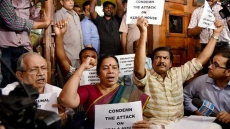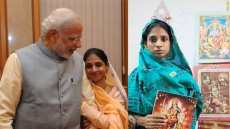The Delhi High Court on Wednesday asked the city government whether it can limit the 15-day odd-even number car regulation scheme to a week, saying it has caused inconvenience to people.
The government said it was earlier decided that the scheme, which has received overwhelming response since its beginning on January 1, will be tried for 15 days to evaluate its impact.
It said vehicular pollution has indeed come down due to success of the scheme, the facts of which the government would put before the court on January 8.
"Is it really necessary to have it for two weeks (15 days)? Can't it be confined to eight days? Can you end it on Friday? People are facing inconvenience. Take instructions," said a division bench of Chief Justice G. Rohini and Justice Jayant Nath to the government.
The bench asked the government to submit the data on air pollution it has collected in a week during implementation of the odd-even scheme.
"It was a pilot project. You must have data (on air pollution) with you now. Show us how much the pollution has reduced. The people of Delhi supported you despite inconvenience. There is no adequate public transport," it added.
In December, after the high court called Delhi a "gas chamber", the Aam Aadmi Party government decided to implement the scheme which allows odd- and even-numbered cars to ply on alternate dates.
Talking to reporters later, Delhi Transport Minister Gopal Rai said there was 30-35 percent reduction in the vehicular emissions in the first five days of the scheme.
He said the government decided to run the scheme for 15 days because it wanted "to have sufficient data and experience".

Green activists expressed dismay over the questioning by the court.
"The government must not be stopped from doing this," Anumita Roychowdhury, executive director at Centre for Science and Environment, told IANS.
"In a time when your (pollution) levels are hitting levels like 300-400, the solution cannot work like a magic bullet that it comes down to 60," she added.
"But what these measures are going to help you to do is bring down the steep levels and lower levels of the toxicity of the pollution," she said.
"What inconvenience? These are the best days in so many years in Delhi. We are saving time, saving fuel. We are not stuck in traffic jams," she added.
The court, while hearing 12 PILs challenging the Delhi government's decision on the odd-even scheme, also asked why diesel cabs were still plying on roads despite a ban.
Advocate Rahul Mehra, appearing for the Delhi government, defended the decision of continuing with the odd-even scheme for 15 days, saying the data collected till now shows decrease in pollution levels.
Meanwhile, in a status report submitted to the court, the government defended its decision to exempt two-wheelers from the scheme.
"In case of two-wheelers, pooling would have been a limited option and it was expected that around 60-70 percent of population would have to resort to public transport. The present available public transport infrastructure is not sufficient to cater to such a huge demand," it said.

The status report said the reduction in the number of four-wheelers helps decrease the congestion on roads "which has a positive effect on vehicular pollution control".





